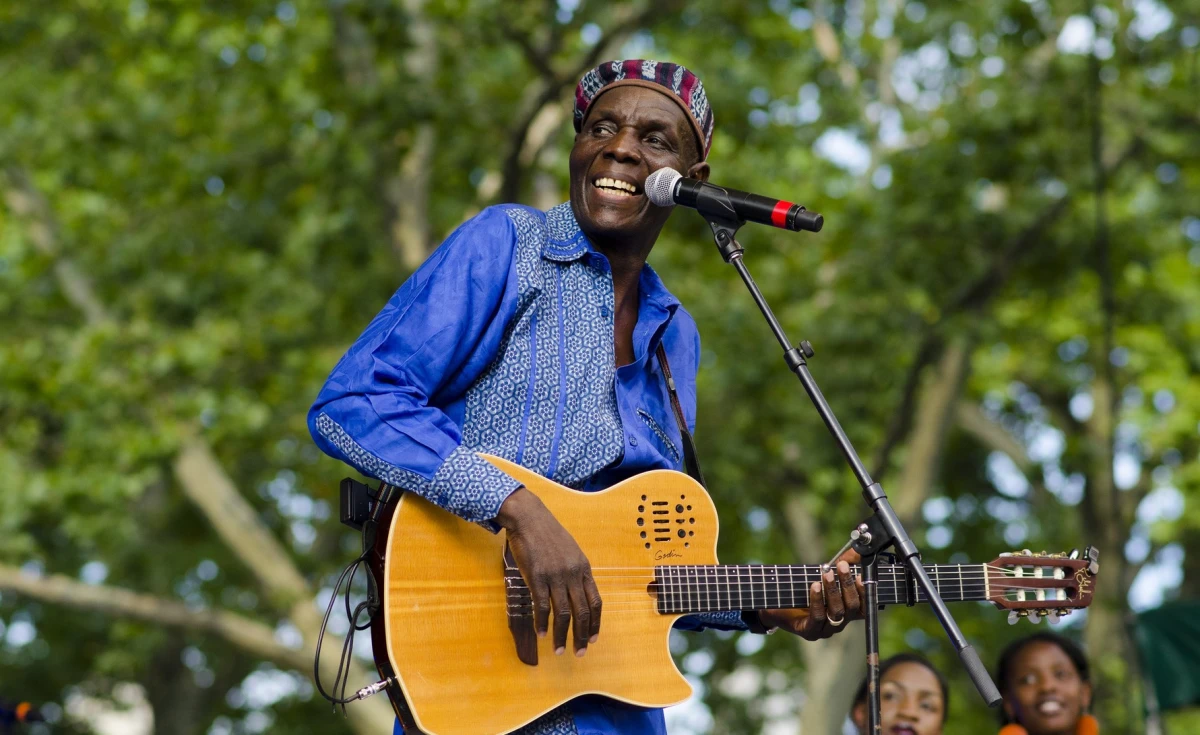Oliver Mtukudzi is Zimbabwe’s distinguished and successful musicians. He is a great art from Africa and toured internationally, singing non-stop with 66 albums. Learn about the legend of Tuku music.

Oliver Mtukudzi is a prolific musician with 66 albums and is considered one of Zimbabwe's most distinguished and successful musicians. However, he didn't rise to this level easily. He had to be a unifier and use Afropop to protest against societal problems.
His sound is worth hearing. The melancholy in Neria can take your heart to the same sad rhythm. Mtukudzi is indeed a great art from Africa and touring internationally and singing non-stop, withstanding many challenges. To his country, he is indeed a perfect gift singing for decades from the 1970s to 2010s.
Key influences that shaped Oliver Mtukudzi's music style and career
Most legendary voices are of humble upbringing in Africa. This is the same as Mtukudzi, who was brought up in the historic township of Highfields (Harare) in Zimbabwe. His music style includes a fusion of his gospel roots, traditional Shona sounds and rhythms, South African mbaqanga, the energetic Zimbabwean pop style JITI, and the traditional karateka drumming of his clan, the Korekore, and a distinctive sound.
This sound is simply labeled as Tuku music. He asserted that his music and art came from his everyday living; he writes about what he sees around him, and since he writes, he sings about things he sees and talks about real things. He believes there is something new to talk about.
He was born on 22 September 1952, and his career started at the advent of Afropop and the global love affair with African root music. Mtukudzi began performing with the Wagon Wheels in 1977. The band featured other great artists like Thomas Mapfumo and fellow guitarist James Chimombe. Paul Tangi Mhova Mkondo, an African nationalist and music promoter who provided money and resources, supported the group with a rare opportunity.
The band was a forerunner of the Afropop revolution and performed in Club Mutanga (Pungwe) with the permission of their benefactor. At that time, this was the only nightclub available for blacks under Rhodesia's policy of segregation. Their electric spin was on long-standing traditions, in songs inspired, among other subjects, by their country’s recent war of liberation from colonial oppression.
Their singles Dzandimomotera went gold. Tuku's first album also followed and was also a major success. Mtukudzi was the band's most recognized voice to emerge from the country and onto the international scene. His husky voice, slender frame, topped with a small afro, and trademark acoustic guitar made him recognizable in music videos.
Oliver Mtukudzi Contribution to Zimbabwe and the Globally Music Scene
After his time at the Wagon Wheels, Mtukudzi recruited his own band of stylish young performers called the Black Spirits. He collaborated and worked with many Zimbabwe talents and South African producers and musicians, including the Mahube (Southern Africa supergroup). He sang in Shona, the majority vernacular language of Zimbabwe, English, and Ndebele.
From his first songs, which protested colonial injustice, to his latest compositions, which call for respect and kindness, his messages are always woven from metaphor, favoring imagery and small snapshots to sweeping political statements.
Oliver Mtukudzi was named the UNICEF Regional Goodwill ambassador for Eastern and Southern Africa in 2011. This is because of his work through music because of his clear message on children’s rights.
His philanthropy includes setting up the Pakare Paye Arts Centre in Zimbabwe. The center is to groom and help young artists hone their skills in courses like dance, music, drama, and poetry. Admission is free in the hopes that the center will help them.
Internationally, he and his group (Black Spirits) have traveled to almost every state in the USA since 1999 and toured extensively throughout Europe, U.K., Africa, Australia, and New Zealand.
Challenges and How He Overcame Them
Tuku experienced the ups and downs that many seasoned musicians mark in their careers. Youngsters thought that traditional instruments were the worst and looked down on them.
His significant and creative move was returning to his musical foundation and traditional sounds and stunning the Zimbabwean scene. He played pop on traditional instruments like mbira (thumb piano) and marimba, alongside his trademark acoustic guitar. He did find the sound he wanted in a traditional instrument. He went on to reframe and refine these sounds to make a very clear and passionate point. This includes three albums playing all songs.
In March 2010, his son Sam Mtukudzi, a successful musician, died in a car accident at the age of 21. Mtukudzi released an album titled "Sarawoga," in tribute to his son.
He battled for a long time with diabetes mellitus. On 23 January, 23 January 2019, Mtukudzi died at the age of 66 at Avenues Clinic in Harare, Zimbabwe.
Oliver Mtukudzi Music Impact
In a 2013 interview with CNN, Mtukudzi said, “Where I come from, you don’t get to sing a song if you have nothing to say.”
The society that Mtukudzi lived in was faced with societal problems. He was responsible for speaking in hushed tones or written off as non-issues. His ability to use the power of music to spread a message was worthwhile. The legend confronted domestic violence and abusive fathers, hardships in an unstable economy, and powerlessness in the face of sorrow.
Tuku, as he was popularly called, used music to campaign for awareness of HIV/AIDS and the rights of AIDS orphans. Someone will say his music to speak to issues that were bigger than him. Despite that, his music sparked conversations. This made people stop and think, and his music also brought ugly realities into the spotlight. Tuku was also a guardian of human rights, including the rights of women, and children, and against class, as well as racialism.
One of the eponymous movies he starred in focused on the treatment of widows in Zimbabwean society, and Tuku wrote and performed the soundtrack. The song is sung from the brother's perspective to his sister, and this is to comfort her through the difficult period she is going through.
Mtukudzi recorded the track after the directors of Winds of Change approached him. After he was given the script, he recorded the song overnight. The directors liked the song so much that they decided to change the movie's name from Winds of Change to Neria.
Oliver Mtukudzi Legacies
Oliver Mtukudzi's music and concerts are a big part of Zimbabwe’s life. He stood for a country with upheaval and instability. For Zimbabweans outside the country, he was a reminder of the home they left behind. The sound of his music depicted the sound of joy, grief, weekend get-togethers, and trips to the work of the Zimbabwean.
Mtukudzi was a unifier when the country had social, political, and cultural divisions. His 66 music albums carried many songs whose main recital was on how people could coexist peacefully and progressively. This is shown in his millions of views on YouTube in 2019.
Among his numerous awards are an honorary degree from the University of Zimbabwe in December 2003; M-Net Best Soundtrack Award in 1992, for Neria; Honorary Doctorate of Humane Letters (DHL) from The Institute of Philanthropy in July 2014; and Best Southern African Male Artist and the Lifetime Achievement Award KORA Music Awards 2003.
Conclusion
Mtukudzi is Zimbabwe’s most renowned and internationally recognized musician. He achieved this feat by using his sound to speak for the people. He is internationally acclaimed, and Zimbabweans go to him for music at all times. He uses the power of music to spread a message and is considered a unifier.
Tuku, as he is popularly called, is Zimbabwe’s spiritual father. All he had was a sound, theme, and voice to face what was bigger than him. If you have a tool, you can do what is bigger than you.

